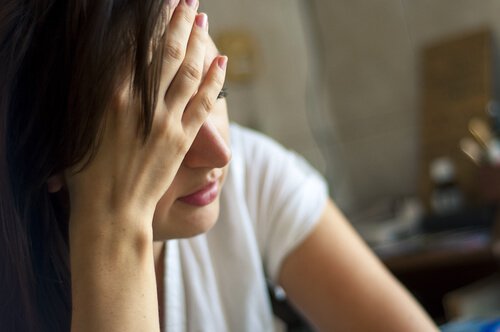Avoiding Stress Is Easy If You Know How

We can consider stress as the process that is set into motion when someone perceives a situation or an event as threatening or exceeding their resources.
The cornerstone of this definition is the term “perceives”. It’s not about whether the threat truly exists or not, but about whether the person perceives it as such.
Oftentimes, the events that put stress into motion are related to changes. Changes which force the individual to exert a greater amount of effort than normal. Therefore, it puts the individual’s well-being at risk.
That is to say, stress isn’t directly related to ceasing to do certain activities or about having little time to accomplish many objectives. Stress is about the individual’s perception more than about the situation itself. Keep in mind that one single situation can be stressful for one person and not for another.
In general, it’s considered that a person is subjected to a stressful situation when they have to confront environmental demands which exceed their resources. Just like that, the sensation emerges that they can’t give an adequate response to those demands in a short amount of time.
“Someone suffering from stress can’t confront environmental demands which exceed their resources.”
-María Crespo-

What kind of situations produce stress?
Stressful life events or situations
They may imply extraordinary events or extremely traumatic ones. Yet, it can also include events that are pretty common, such as a marriage, divorce, getting fired, etc.
The ones which have been studied the most, according to the impact they have on the person’s health, are the following: situations involving war, acts of terrorism, abuse, rape, terminal diseases, emigration, natural disasters or man-made disasters. As well as vital events that are highly traumatic, such as divorce, and the loss of a loved one, among others.
Daily events
We’re referring to “minor” events which take place with a certain level of daily occurrence. Events such as family disputes, economic problems, traffic jams, memory lapses…
The accumulation of this type of events has shown a great predictive capacity of the individual’s psychological and somatic functioning. Also, of their well-being, an effect which is even superior to the one found in the case of stressful life events.
Situations of chronic continuous tension
These imply the most important source of stress because in addition to the intensity of the situation itself (similar to that of stressful life events), their presence is continuous and daily.
We could give the example of a conflictive work position, with a constant overload of work or with uncertain perspectives of the future; constant family disputes; situations of social marginalization; caretakers of patients with chronic diseases, the elderly or demented; etc.
“Situations of chronic continuous tension which are maintained over time make up the most important source of stress.”
-Francisco J. Labrador-

What can I do to avoid or reduce my stress?
Do physical exercise
Moderate physical exercise (30-minute walks, for example) improves your health, your appearance and reduces your levels of tension. You no longer have any excuses to not exercise or not practice some sort of sport. This applies to everyone, whether you suffer from stress or not.
With physical exercise, we secrete endorphins, which are substances (endogenous opioid peptides) that our bodies naturally produce in order to lessen the blow of pain and produce a sensation of well-being. That’s why endorphins are also known as happiness hormones.
Take care of your health
It may seem obvious, but most of us don’t take good enough care of our health. Follow a balanced diet, sleep the recommended amount of hours, and avoid harmful habits such as the consumption of tobacco, alcohol, and other drugs. People with a tendency to suffer from anxiety are more likely to develop unhealthy behaviors.
Think about it, when you feel stressed, you’re more likely to neglect your diet. This unbalance fundamentally corresponds with excess eating and with consuming foods high in calories and low in nutrients. That is to say, food with “empty calories”.
Organize your time
You’re better off having time left over, than exhausting yourself by leaving everything until the last second. Prepare meetings and gatherings ahead of time and, if necessary, get up a little earlier in the morning to not have to rush through the start of your day. Keep in mind that your body needs some time to “warm up”.
An agenda can really help you organize your time. In this agenda, you will write down everything you have to do throughout the day. Also, you will categorize the tasks that are urgent, less urgent, and able to be postponed.
You can use a color code to divide these tasks into categories, in a way that you’ll be able to identify them at a glance.

Establish schedules and routines
Routines are especially soothing for people who feel like they are easily overwhelmed. Having a routine creates a sensation of order and control. It also fights off the tendency to do a thousand things at once without really focusing on any of them. This is characteristic of people who struggle with stress.
If you establish schedules and routines, you’ll be able to keep in mind the important things you have to do every day. It’s important for you to not take on more tasks than you can actually accomplish.
Also, make some wiggle room for possible setbacks. This, without a doubt, will provide a great sensation of control which is incompatible with stress.
Try to be optimistic
Optimistic people suffer from fewer physical signs of stress than pessimistic ones. The predisposition towards optimism or pessimism determines the amount and intensity of unnecessary stress that each person experiences throughout their life.
Believe it or not, you can actually learn to be more optimistic and, consequently, reduce your stress. To do so, it’s essential for you to learn to speak to yourself in a different manner than you usually do. Seek evidence against the things you fear in a catastrophic way.
Laugh, and cultivate a sense of humor.
Laughter helps you relax because when you laugh you see the kind and absurd side of any situation. You also manage to make your difficulties seem less serious and severe.
This doesn’t mean that you have to fool yourself when facing certain situations. However, you can put in the effort of attempting to see the comical side of bad situations. Or, find the stroke of humor in your everyday conversations with others. Everyone will thank you for it, including yourself.
Interact, share, and cultivate your affection
Very few stressful situations can’t be reduced with the presence, support, and comprehension of a loved one. Thus, I recommend that you improve your communication skills as best you can, so that your relationships may improve. So much so that you’ll be able to show your appreciation for others, so as to resolve conflicts and negotiate skillfully.
Consider this: having a good social support network helps mitigate the effects of stress. It also improves fallen spirits. Furthermore, regardless of whether others are present or not, the important thing is for the stressed or sad individual to perceive their availability and closeness.
“No one would choose to live without friends, even if they had every other good.”
-Aristotle-

To wrap things up, there is something I have yet to mention: maintaining your contact with nature. Contemplating the wonder of nature isn’t just beautiful, it is also very relaxing.
It helps you concentrate on something other than yourself, something external. Feeling like part of the life that surrounds us allows us to put our worries into perspective and reduce our levels of tension.
If putting this advice into practice doesn’t help you reduce your levels of stress, remember that you can always seek out professional help.
It will help you live in a more tranquil manner, enjoying and savoring every minute of your existence. It will teach you skills that will allow you to relax and confront everything that stresses you.
We can consider stress as the process that is set into motion when someone perceives a situation or an event as threatening or exceeding their resources.
The cornerstone of this definition is the term “perceives”. It’s not about whether the threat truly exists or not, but about whether the person perceives it as such.
Oftentimes, the events that put stress into motion are related to changes. Changes which force the individual to exert a greater amount of effort than normal. Therefore, it puts the individual’s well-being at risk.
That is to say, stress isn’t directly related to ceasing to do certain activities or about having little time to accomplish many objectives. Stress is about the individual’s perception more than about the situation itself. Keep in mind that one single situation can be stressful for one person and not for another.
In general, it’s considered that a person is subjected to a stressful situation when they have to confront environmental demands which exceed their resources. Just like that, the sensation emerges that they can’t give an adequate response to those demands in a short amount of time.
“Someone suffering from stress can’t confront environmental demands which exceed their resources.”
-María Crespo-

What kind of situations produce stress?
Stressful life events or situations
They may imply extraordinary events or extremely traumatic ones. Yet, it can also include events that are pretty common, such as a marriage, divorce, getting fired, etc.
The ones which have been studied the most, according to the impact they have on the person’s health, are the following: situations involving war, acts of terrorism, abuse, rape, terminal diseases, emigration, natural disasters or man-made disasters. As well as vital events that are highly traumatic, such as divorce, and the loss of a loved one, among others.
Daily events
We’re referring to “minor” events which take place with a certain level of daily occurrence. Events such as family disputes, economic problems, traffic jams, memory lapses…
The accumulation of this type of events has shown a great predictive capacity of the individual’s psychological and somatic functioning. Also, of their well-being, an effect which is even superior to the one found in the case of stressful life events.
Situations of chronic continuous tension
These imply the most important source of stress because in addition to the intensity of the situation itself (similar to that of stressful life events), their presence is continuous and daily.
We could give the example of a conflictive work position, with a constant overload of work or with uncertain perspectives of the future; constant family disputes; situations of social marginalization; caretakers of patients with chronic diseases, the elderly or demented; etc.
“Situations of chronic continuous tension which are maintained over time make up the most important source of stress.”
-Francisco J. Labrador-

What can I do to avoid or reduce my stress?
Do physical exercise
Moderate physical exercise (30-minute walks, for example) improves your health, your appearance and reduces your levels of tension. You no longer have any excuses to not exercise or not practice some sort of sport. This applies to everyone, whether you suffer from stress or not.
With physical exercise, we secrete endorphins, which are substances (endogenous opioid peptides) that our bodies naturally produce in order to lessen the blow of pain and produce a sensation of well-being. That’s why endorphins are also known as happiness hormones.
Take care of your health
It may seem obvious, but most of us don’t take good enough care of our health. Follow a balanced diet, sleep the recommended amount of hours, and avoid harmful habits such as the consumption of tobacco, alcohol, and other drugs. People with a tendency to suffer from anxiety are more likely to develop unhealthy behaviors.
Think about it, when you feel stressed, you’re more likely to neglect your diet. This unbalance fundamentally corresponds with excess eating and with consuming foods high in calories and low in nutrients. That is to say, food with “empty calories”.
Organize your time
You’re better off having time left over, than exhausting yourself by leaving everything until the last second. Prepare meetings and gatherings ahead of time and, if necessary, get up a little earlier in the morning to not have to rush through the start of your day. Keep in mind that your body needs some time to “warm up”.
An agenda can really help you organize your time. In this agenda, you will write down everything you have to do throughout the day. Also, you will categorize the tasks that are urgent, less urgent, and able to be postponed.
You can use a color code to divide these tasks into categories, in a way that you’ll be able to identify them at a glance.

Establish schedules and routines
Routines are especially soothing for people who feel like they are easily overwhelmed. Having a routine creates a sensation of order and control. It also fights off the tendency to do a thousand things at once without really focusing on any of them. This is characteristic of people who struggle with stress.
If you establish schedules and routines, you’ll be able to keep in mind the important things you have to do every day. It’s important for you to not take on more tasks than you can actually accomplish.
Also, make some wiggle room for possible setbacks. This, without a doubt, will provide a great sensation of control which is incompatible with stress.
Try to be optimistic
Optimistic people suffer from fewer physical signs of stress than pessimistic ones. The predisposition towards optimism or pessimism determines the amount and intensity of unnecessary stress that each person experiences throughout their life.
Believe it or not, you can actually learn to be more optimistic and, consequently, reduce your stress. To do so, it’s essential for you to learn to speak to yourself in a different manner than you usually do. Seek evidence against the things you fear in a catastrophic way.
Laugh, and cultivate a sense of humor.
Laughter helps you relax because when you laugh you see the kind and absurd side of any situation. You also manage to make your difficulties seem less serious and severe.
This doesn’t mean that you have to fool yourself when facing certain situations. However, you can put in the effort of attempting to see the comical side of bad situations. Or, find the stroke of humor in your everyday conversations with others. Everyone will thank you for it, including yourself.
Interact, share, and cultivate your affection
Very few stressful situations can’t be reduced with the presence, support, and comprehension of a loved one. Thus, I recommend that you improve your communication skills as best you can, so that your relationships may improve. So much so that you’ll be able to show your appreciation for others, so as to resolve conflicts and negotiate skillfully.
Consider this: having a good social support network helps mitigate the effects of stress. It also improves fallen spirits. Furthermore, regardless of whether others are present or not, the important thing is for the stressed or sad individual to perceive their availability and closeness.
“No one would choose to live without friends, even if they had every other good.”
-Aristotle-

To wrap things up, there is something I have yet to mention: maintaining your contact with nature. Contemplating the wonder of nature isn’t just beautiful, it is also very relaxing.
It helps you concentrate on something other than yourself, something external. Feeling like part of the life that surrounds us allows us to put our worries into perspective and reduce our levels of tension.
If putting this advice into practice doesn’t help you reduce your levels of stress, remember that you can always seek out professional help.
It will help you live in a more tranquil manner, enjoying and savoring every minute of your existence. It will teach you skills that will allow you to relax and confront everything that stresses you.
This text is provided for informational purposes only and does not replace consultation with a professional. If in doubt, consult your specialist.







